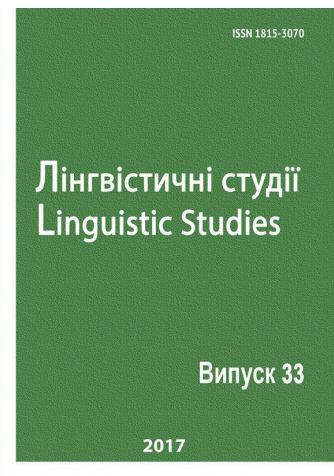Axiophraseme Pragmatics: Representation of Code Culture in the Axiological World’s Image (on the Material of English, German, Ukrainian and Russian).
Keywords:
axiophrasemic pragmatics, categorization, cultural code, phraseme, value, the axiological world’s imageAbstract
The role of associations in presentation of values in Ukrainian, Russian, English and German phrasemics was determined with the projection onto somatic, biomorphic, natural, coloring, quantitative and gastronomic codes of culture. The peculiarities of functioning of components of phraseme-somatisms, zoosemisms, phytocomponent, colouring, numerical and meteorological components were also described on the phrasemic level of the axiological world’s image.References
Bagautdinova, Guzel’. “Chelovek vo Frazeologiyi: Antropotsentricheskiy i Aksiologicheskiy Aspekty (People in Phraseology: an Anthropocentric and Axiological Aspects)’’. Diss. Kazan state U named after V.I. Ulyanov-Lenin, 2007. Abstract. Print.
Batsuren, Renchin. “Otobrazheniye Universal'nykh i Etnospetsyficheskikh Chert Yazykovoy Kartiny Mira v Frazeologicheskikh Fondakh Angliyskogo, Russkogo i Mongol’skogo Yazykov (To Display Generic and Ethnospecific Traits of the Language Picture of the World in Phraseological Funds of English, Russian and Mongolian)’’. Diss. Saratov state U named after N.G. Chernyshevsky, 2010. Abstract. Print.
Chybor, Iryna. “Reprezentatsiya Mifolohichnoho Etnokodu Kul’tury v Ukrayins’kiy Frazeolohiyi (The Representation of the Mythological Ethnocode of Culture in Ukrainian Phraseology)’’. Diss. Chernivtsi National U named after Yuriy Fed’kovych, 2016. Abstract. Print.
Cowie, Anthony Paul. Phraseology: Theory, Analysis and Applications (Oxford Studies in Lexicography and Lexicology). New York. 2001. Print.
Fiedler, Sabine. English Phraseology. A Coursebook. Tübingen: Gunter Narr Verlag. 2007. Print.
Földes, Csaba. Deutsche Phraseologie kontrastiv. Intra- und interlinguale Zugänge. Heidelberg: Groos. 1996. Print.
Gudkov, Dmitriy, and Kovshova, Mariya. Telesnyy Kod Russkoy Kul’tury. Materialy k Slovaryu (Corporal Code of the Russian Culture. Materials to the Dictionary). Moscow: Gnozis. 2007. Print.
Krasnykh, Viktoriya. Etnopsikholingvistika i Lingvokul’turologiya: Kurs Lektsiy (Ethnopsycholinguistics and Linguoculturology: a Course of Lectures). Moscow: Gnozis. 2002. Print.
Krasnobaieva-Chorna, Zhanna. Linhvofrazemna Aksiolohiya: Paradyhmal’no-Katehoriynyy Vymir (Linguaphrasemic Axiology: Paradigmal-Categorical Dimension). Vinnytsia: TOV «Niland-LTD». 2016. Print.
Krzyżanowska, Anna. Polska i francuska frazeologia śmierci. Lublin: W-wo UMCS. 1999. Print.
Savchenko, Liubov. Fenomen Etnokodiv Dukhovnoyi Kul’tury u Frazeolohiyi Ukrayins’koyi Movy: Etymolohichnyy ta Etnolingvistychnyy Aspekty (Ethnic code the Phenomenon of Spiritual Culture in Phraseology of the Ukrainian: Etymological and Ethnolinguistic Aspects). Simferopol’: Dolia. 2013. Print.
Selivanova, Olena. Narysy z Ukrayins’koyi Frazeolohiyi (Psykhokohnityvnyy ta Etnokul’turnyy Aspekty) (Essays on Ukrainian Phraseology (Psichocognitive and Ethnocultural Aspects)). Kyiv-Cherkasy: Brama. 2004. Print.
Teliya, Veronika. Russkaya Frazeologiya: Semanticheskiy, Pragmaticheskiy i Lingvokul’turologicheskiy Aspekty (Russian Phraseology: Semantic, Pragmatic and Linguacultural Aspects). Moscow: Yazyki russkoy kul’tury. 1996. Print.


